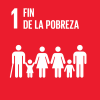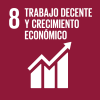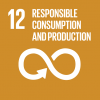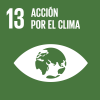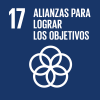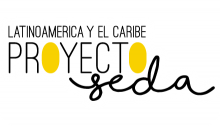
Proporcionar capacidades, herramientas y tecnología apropiada para la sericultura con el fin de favorecer el desarrollo de una actividad económica sostenible adaptada para las poblaciones más vulnerables.
Funcionarios y empleados de las instituciones socias del proyecto.
Responsables de la gestión de instituciones implicadas en la formación en sericicultura y en la producción sericícola.
Responsables de cooperativas, emprendedores de sectores marginales, pequeños campesinos, pequeños artesanos y productores sericícolas de los países implicados.
Núcleos familiares y comunidades de los beneficiarios directos del proyecto.
-

El proyecto ha realizado una visita de estudios a ITMA 2019 Textile & Garment Technology Exhibition / ITMA 2019 Exposición Internacional de Maquinaria Textil organizada por el European Committee of Textile Machinery Manufacturers (CEMATEX) / Comité Europeo de Fabricantes de Maquinaria Textil, celebrada en Barcelona.
-

La Cooperativa Sociale SOCIOLARIO / Cooperativa Social SOCIOLARIO es un socio estratégico desde el origen del proyecto.
-

La Direzione Generale per la Cooperazione allo Sviluppo - Ministero degli Affari Esteri e della Cooperazione Internazionale / Dirección General de Cooperación para el Desarrollo - Ministerio de Asuntos Exteriores y de Cooperación Internacional y la Fondazione CARIPLO / Fundación CARIPLO financiaron la iniciativa de la Organizzazione Internazionale Italo-Latino Americana / Organización Internacional Ítalo-latinoamericana (IILA) de creación de la ´Red Latinoamericana de la Seda (RELASEDA)´ que es el embrión del proyecto SEDA, en la que participa también la Società Cooperativa Sociale SOCIOLARIO / Cooperativa Social SOCIOLARIO.
-

El proyecto ha realizado una visita de estudios a la edición de 2019 de la International Silk Conference, organizada por la Universitá di Trento / Universidad de Trento, celebrada en Trento.
-

El proyecto ha realizado una visita de estudios al Consiglio per la Ricerca in Agricoltura e l’Analisi dell’Economia Agraria (CREA) / Consejo para la Investigación en Agricultura y el Análisis de la Economía Agrícola, líder en el tema sericícola y propietario del banco de germoplasma del bombix mori de la Unión Europea.
-

Los profesores Silvia Cappellozza, coordinadora del Consiglio per la Ricerca in Agricoltura e l’Analisi dell’Economia Agraria (CREA) / Consejo para la Investigación en Agrícola y el Análisis de la Economía Agrícola, Giovanna Salice, coordinadora de la ´Red Latinoamericana de la Seda (RELASEDA)´, Germano Allara, experto en colorantes naturales, y Giorgio Allara, experto en producción sericícola, han asesorado al proyecto.
-

La Universidade do Minho / Universidad del Miño ha asesorado al proyecto en distintos momentos y durante la ejecución se ha convertido en socio colaborador.
-

El proyecto ha realizado una visita de estudios al Grupo FIBRENAMICS, la plataforma internacional multisectorial para el desarrollo de materiales y productos innovadores basados en fibra, coordinado por la Universidade do Minho / Universidad del Miño y con sede en Guimarães.
-

El proyecto ha realizado una visita de estudios a la 4th International Conference on Natural Fibers (ICNF 2019), con el lema 'Smart Sustainable Solutions', organizada por la Universidade do Minho / Universidad del Miño y celebrada en Oporto, en la que presentó un trabajo sobre los logros del proyecto.
» Más información aquí
-

El profesor Raul Fangueiro, director del Grupo FIBRENAMICS, la plataforma internacional multisectorial para el desarrollo de materiales y productos innovadores basados en fibra, coordinada por la Universidade do Minho / Universidad del Miño, ha asesorado al proyecto.
-

La consultora Marina Chahboune ha realizado una consultoría internacional para el proyecto en el ámbito de la sostenibilidad de la moda, con un foco especial en la Economía Circular.
-

El Proyecto ha sido invitado por la Messe Frankfurt / Feria de Fráncfort a participar en sus exposiciones textiles internacionales con sede en Argentina, recibiendo apoyo para la difusión de sus actividades a través de un stand y de la inclusión de ponencias dentro del programa oficial, además de la correspondiente difusión en medios de comunicación.
STUDY VISITS
-
-

Visita de estudio a la ‘Exposición Internacional de Maquinaria Textil (ITMA)’, en Barcelona, para profundizar en el conocimiento sobre las últimas tecnologías de procesamiento de fibras
» For more information click here -

Visita de estudio a la ‘IV Conferencia internacional sobre fibras naturales’, a la Universidad del Miño y al Grupo FIBRENAMICS, en Oporto y Guimarães, para profundizar en el conocimiento sobre sobre procesos y productos textiles innovadores y sustentables
» For more information click here -

Visita de estudio al ‘Congreso trienal de la Comisión Internacional de Sericultura (ISC)’, en Tsukuba, para profundizar en el conocimiento sobre biología celular y molecular en la industria sericícola
» For more information click here -

Visita de estudio al ‘Consejo para la Investigación en Agricultura y el Análisis de la Economía Agrícola (CREA)’, en Padua, para profundizar en el conocimiento sobre técnicas de producción sericícola
» For more information click here
-
INTERNATIONAL CONSULTANCY
-
-

Consultoría internacional para el apoyo a la implantación de estrategias orientadas a la sustentabilidad en el sistema de la moda, de forma principal basadas en la Economía Circular
» For more information click here
-
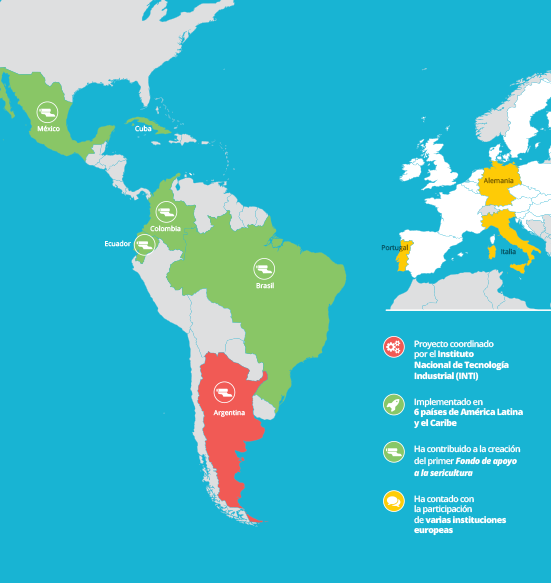
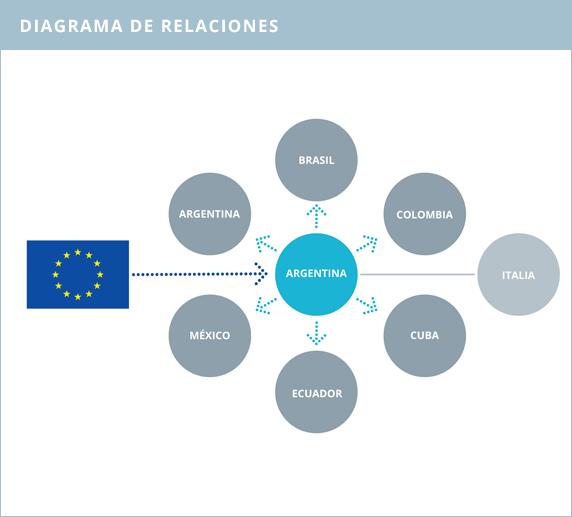
Contribuimos a la reducción de la pobreza a través de la sericicultura. Promovemos el trabajo decente y el crecimiento económico apoyando el asociacionismo. Capacitamos sobre producción y consumo responsable de manera sustentable y eficiente, reutilizando subproductos de la seda y desarrollando productos con diseño. Alentamos el empoderamiento de las mujeres en los grupos de trabajo, brindando herramientas y espacios con tecnología apropiada para que mujeres y poblaciones en situación de vulnerabilidad puedan desarrollar la actividad.
MAIN CONTRIBUTION, FROM THE PROJECT'S THEMATIC PERSPECTIVE
CONTRIBUTION FROM A PARTICULAR PROJECT COMPONENT, COMPLEMENTARY TO THE MAIN TOPIC
CONTRIBUTION FROM CROSSCUTTING TOPICS
Lessons Learnt
The National Institute of Industrial Technology (INTI), which coordinated the project, had an extensive experience of good cooperation with the European Union (and other international donors) and had its own pr...
Success Stories
Thanks to the development, from the beginning of the project, of an inclusive communication and visibility strategy, which includes guidelines agreed upon by the different partners, it has been possible to guarantee a smooth external communic...
Thanks to the project, the principle of circular economy has been introduced in the models of sericulture production promoted in the region. Based on a specialised consultancy, the necessary guidelines to apply...
Good Practices
Defining and organising, within the framework of a methodology, a series of essential guidelines aimed at identifying the final beneficiaries and establishing the lines of work with them in the face of the chal...
Sala de prensa
En esta sección encontrarás toda la información sobre el proyecto Proyecto SEDA, específicamente elaborada para los medios de comunicación.
Descargar gacetilla del proyecto:





